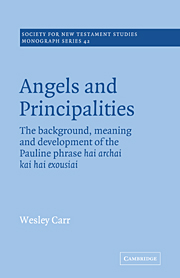 Angels and Principalities
Angels and Principalities Book contents
- Frontmatter
- Contents
- Preface
- Abbreviations
- General Introduction
- PART 1 The Background to Paul's Thought on the Powers
- PART 2 Exegesis of Pauline Texts
- PART 3 The post-Pauline development
- 6 Texts within the New Testament
- 7 Ignatius of Antioch
- 8 The angelomorphic Christology of early Jewish Christianity
- 9 The Greek apologists
- 10 Clement of Alexandria
- 11 The influence of gnosticism
- 12 Origen
- Conclusion to Part 3
- PART 4 Final Remarks
- Notes
- Select Bibliography
- Index
6 - Texts within the New Testament
Published online by Cambridge University Press: 06 January 2010
- Frontmatter
- Contents
- Preface
- Abbreviations
- General Introduction
- PART 1 The Background to Paul's Thought on the Powers
- PART 2 Exegesis of Pauline Texts
- PART 3 The post-Pauline development
- 6 Texts within the New Testament
- 7 Ignatius of Antioch
- 8 The angelomorphic Christology of early Jewish Christianity
- 9 The Greek apologists
- 10 Clement of Alexandria
- 11 The influence of gnosticism
- 12 Origen
- Conclusion to Part 3
- PART 4 Final Remarks
- Notes
- Select Bibliography
- Index
Summary
The interpretation of the work of Christ in terms of hostile powers and their defeat is certainly found in Christian thought by the end of the second century. The question must therefore be asked as to how Paul's language of the powers came to be so interpreted. Within the NT, outside the Pauline literature, the angelic powers are chiefly mentioned in Revelation, 2 Peter and Jude. These three books require discussion, but this does not imply that they represent developments upon a Pauline theme. They are, however, all most probably assignable to a period of Christian history subsequent to Paul and give valuable instances of thinking that was found in the Church.
The Revelation of Saint John the Divine
Accepting that this book was written towards the end of the first century, we may observe in it how the language and attitudes of Jewish apocalyptic remain constant within a definitely Christian tradition that is found in Asia Minor. There are no points of direct connection between Pauline literature and Revelation.
Angels are understood in three main ways in the book. They function simply as heralds of God (1: 1; 5: 2 etc.). Sometimes the epithet ἴσχυς is applied (10: 1; 18: 21), which may suggest a class of ἴσχυροι. Within the conventions of apocalyptic this should not occasion surprise, and it might be an exact parallel to that extension of God as δύναμις through the creation of δυνάμεις, which we have already noted.
- Type
- Chapter
- Information
- Angels and PrincipalitiesThe Background, Meaning and Development of the Pauline Phrase hai archai kai hai exousiai, pp. 127 - 135Publisher: Cambridge University PressPrint publication year: 1981


